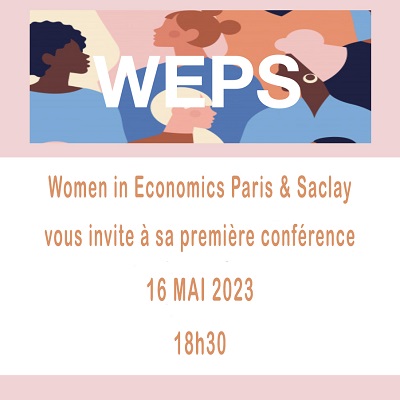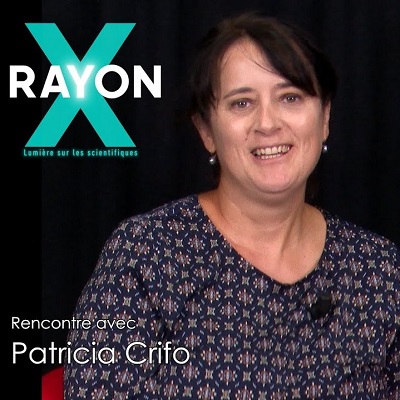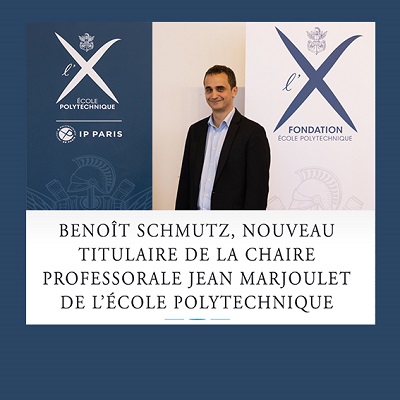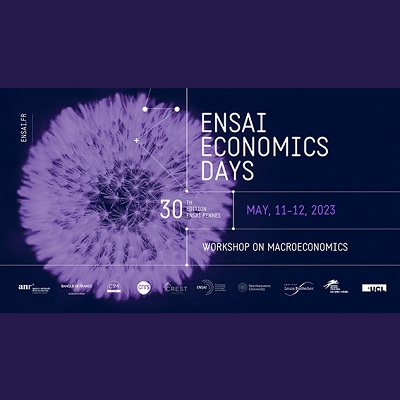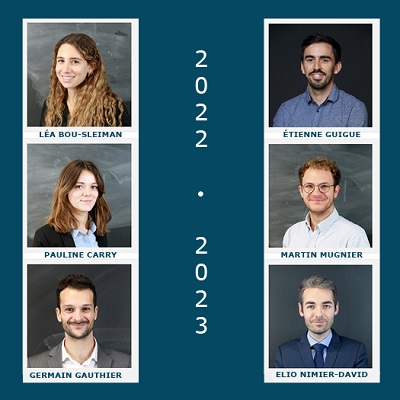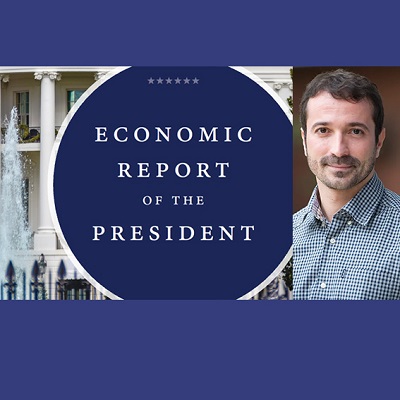
(English version below)
Women in Economics Paris and Saclay (WEPS)
WEPS est une initiative, visant à évaluer, réfléchir et améliorer la place des femmes et des minorités de genre dans le domaine de l’économie.
L’association diffuse des connaissances académiques sur les déséquilibres entre les sexes, en créant des espaces pour partager des expériences et en renforçant les liens entre les femmes économistes et les économistes issus des minorités de genre.
1ère conférence le 16 mai 2023 à 18h30, ENSAE Amphi 250
S’inscrire à la conférence
Women in Economics Paris & Saclay organise sa première conférence, soutenue par le CREST, sur la forme d’une table ronde qui sera suivie d’une discussion ouverte sur plusieurs thématiques :
- Quelle est l’ampleur des violences sexistes et sexuelles dans le monde universitaire ? Comment les mesurer et les étudier ?
- Quelles sont les dynamiques spécifiques au contexte académique ?
- De quels outils les institutions universitaires disposent-elles pour lutter contre les violences sexistes et sexuelles ?
Ces tables rondes seront l’occasion de laisser la parole à des personnalités du monde académique :
- Viviane ALBENGA
Sociologue à l’Université Bordeaux-Montaigne, Sociologue du Genre et de l’intersectionnalité – co-autrice avec J. Dagorn de « Après# MeToo: Réappropriation de la sororité et résistances pratiques d’étudiantes françaises » (2019), Mouvements, (3), 75-84 (disponible sur Cairn)
- Armelle ANDRO
Démographe, professeure à l’université de Paris 1 Panthéon-Sorbonne, Responsable scientifique de la direction de la santé publique de la Ville de Paris – autrice de « Mind the Gap : avancées et résistances dans la prise en charge des violences sexuelles et sexistes dans le monde académique (2002-2022) » (2023), Mouvements, vol. 113, n°1, 2023 (disponible sur Cairn)
- Farah DERUELLE
Doctorante en sociologie à l’Université de Toulouse II Jean Jaurès, Sociologue du travail, du genre et de la sexualité – autrice de « La sexualité en colloque, une ‘parenthèse enchantée’ ? Violences et rituels professionnels à l’épreuve de l’égalité des carrières scientifiques » (2022) Terrains & travaux, 40, 89-111 (disponible sur Cairn)
- Une militante du CLASCHES
Collectif de lutte contre le harcèlement sexuel dans l’enseignement supérieur
“Sexual and Gender-based violence at university” Conference
Join the Conference
Women in Economics Paris and Saclay (WEPS)
WEPS is an initiative to assess, reflect and improve the place of women and gender minorities in the field of economics.
The association disseminates academic knowledge on gender imbalances, creating spaces for sharing experiences and strengthening links between women and minority economists.
1st conference on 16 May 2023 at 6.30 pm, amphitheatre 250 at ENSAE
Women in Economics Paris & Saclay is organizing its first conference, supported by CREST, in the form of a round table discussion followed by an open debate on several themes:
– The magnitude of sexual and gender-based violence at university
– Understanding the dynamics of gender-based violence that are specific to academic contexts
– The tools and solutions at the institutional level to fight against sexual and gender-based violence.
These round tables will be an opportunity to hear from leading figures in the academic world:
- Viviane ALBENGA
sociologist at Université Bordeaux-Montaigne, Sociology of Gender and intersectionality – co-author with J. Dagorn of « Après# MeToo: Réappropriation de la sororité et résistances pratiques d’étudiantes françaises » (2019), Mouvements, (3), 75-84
- Armelle ANDRO
demographer, senior lecturer at Institut de démographie de l’Université Paris 1 associated researcher at Ined, referent for equality gender at Université Paris 1 from 2020 to 2022 – author of « Mind the Gap : avancées et résistances dans la prise en charge des violences sexuelles et sexistes dans le monde académique (2002-2022) » (2023), Mouvements, vol. 113, n°1, 2023
- Farah DERUELLE
PhD student in sociology at Université Toulouse II Jean Jaurès, Sociology of work, gender and sexuality – author of ‘La sexualité en colloque, une « parenthèse enchantée » ? Violences et rituel professionnels à l’épreuve de l’égalité des carrières scientifiques’
- A CLASCHES activist
Pierre Boyer interviewé sur le “consentement à l’impôt” sur France Culture
Pierre Boyer, enseignant chercheur à l’École polytechnique/CREST et directeur adjoint de l’IPP était l’invité du journal de 22h de France Culture – 24 avril 2023
“Le do-it-yourself, le nouveau dada des cadres”
Les travaux de recherche de Victoire Sessego cités dans l’article de la journaliste Fanny Guyomard du journal Les Echos. 18 avr. 2023
Discover ‘ELMI’, a network of 11 European institutes for Labour Research
ELMI is a platform to exchange of ideas, data & staff w/ members initiating common research projects & joint publications
RAYON X : Rencontre avec Patricia Crifo
Patricia Crifo, Professeur à l’X au Centre de recherche en économie et statistique (CREST), s’est prêtée au jeu de “Rayon X, lumière sur les scientifiques”.
Sans préparation, elle a répondu aux questions sérieuses ou non, pour mieux faire connaître son métier de chercheuse en économie.
Site personnel de Patricia Crifo: https://sites.google.com/site/patriciacrifo/
“Rayon X – Lumière sur les scientifiques”
Les vidéos de la série “Rayon X” mettent en lumière des chercheuses et des chercheurs. Car au fond, qui sont les scientifiques ?
En répondant à des questions sérieuses, et à d’autres qui le sont beaucoup moins, ceux-ci démystifient leur travail, la recherche, et évoquent ce qui les anime et leur quotidien (reconnaissance, travail d’équipe, diversité, transmission, confiance, etc.)
Retrouvez l’ensemble des interviews “Rayon X” :
https://www.youtube.com/watch?v=iBfSQmKuYiY&list=RDCMUCBV0UXKsSD3S2XQMD20QrtQ&start_radio=1&rv=iBfSQmKuYiY&t=10
Teaser :
https://www.youtube.com/watch?v=9r7HdqTV0T0
Benoît Schmutz, nouveau titulaire de la chaire professorale Jean Marjoulet de l’École Polytechnique
Chercheur au CREST et professeur au département d’économie de l’École Polytechnique et spécialiste des questions d’économie urbaine, Benoît Schmutz est le nouveau titulaire de la chaire professorale Jean Marjoulet. Il succède à Camille Duprat, enseignante-chercheuse au Laboratoire d’hydrodynamique (CNRS, École polytechnique – IP Paris).
ENSAI Economics Days 2023_ Workshop on Macroeconomics – Rennes, 11-12 May 2023
The CREST, ENSAI, UCL and NU are pleased to organize a workshop in Macroeconomics, the 30th ENSAI Economics Days, in Rennes, on May 11-12, 2023
Discover the 2023 CREST Econ Job Placement
The Crest is proud and happy for the wonderful placement of its Econ Job Market candidates
Five CREST researchers ranked by Research.com
| Research.com is a platform whose purpose is to make easier access to science. The platform offers an access to a list of leading scientists based on a wide range of metrics such as the number of citations, number of publications and a list of their awards and achievements which are compiled from various bibliometrics data sources |
 |
1. Mathematics

10. Christian P. Robert
Affiliated researcher, Professor at Dauphine, teaching at ENSAE
Christian P. Robert is a highly regarded researcher in the field of statistics and probabilistic modeling, and his work has contributed significantly to the development of Bayesian statistics, Monte Carlo methods, and machine learning.

23. Alexandre Tsybakov
Permanent researcher, Professor at ENSAE
Alexandre Tsybakov is a highly regarded researcher in the field of statistics, and his work has contributed significantly to the development of nonparametric and high-dimensional statistics, and machine learning.

30. Christian Gourieroux
Emeritus Professor at ENSAE, Professor at University of Toronto and Toulouse School of Economics
Gourieroux’s research has been instrumental in advancing the field of econometrics and has had a significant impact on empirical finance and related fields.
2. Economics and Finance

9. Christian Gourieroux
Emeritus Professor at ENSAE, Professor at University of Toronto and Toulouse School of Economics
Christian Gourieroux is a prominent economist and econometrician, known for his contributions to time series analysis, econometrics, financial econometrics, and empirical finance. He has published extensively in top academic journals and has received numerous honoris causa and awards for his work.

14. Francis Kramarz
Permanent researcher, Professor at ENSAE
Kramarz’s research has had a significant impact on the field of labor economics, providing new insights into the workings of labor markets and informing public policy debates on important social and economic issues.

33. Alain Monfort
Emeritus Professor at ENSAE
Monfort’s research has made significant contributions on the field of econometrics and financial economics, advancing our understanding of financial markets, time series econometrics, and he linkages between macroeconomic and financial variables.
All members of CREST have joined to congratulate their fellow colleagues for their ranks!
Economist Giovanni Ricco’s Work Featured in the 2023 Economic Report of the President

Giovanni Ricco joined CREST in January 2023. He was previously a professor in economics at the University of Warwick and a researcher affiliated with several institutions, including the OFCE – Sciences Po, the Centre for Economic Policy Research (CEPR), Economic Research Southern Africa (ERSA), and the South African Reserve Bank (SARB). He has a PhD in Economics from the London Business School and a PhD in Physics from the ‘Galileo Galilei’ School of Graduate Studies of Università di Pisa. He has also earned a Master of Science in Economics with distinction from LUISS ‘Guido Carli’ University and a Master in Quantitative Finance from Università degli Studi di Bologna ‘Alma Mater’. Ricco has had several other professional engagements, including consulting work for Danmarks Nationalbank, being a visiting professor at Université Paris-Dauphine, and serving as a senior economist at the European Central Bank. He has also been a research fellow and visiting research fellow at several institutions. Ricco has published articles in various journals, including the European Economic Review, The Review of Economics and Statistics, and the American Economic Journal: Macroeconomics.
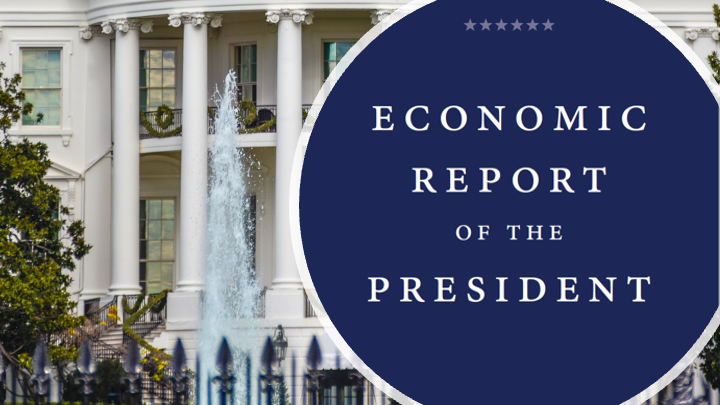
Economic Report of the President
In the US, the Economic Report of the President is an annual report written by the Chairman of the Council of Economic Advisers, which provides an overview of the nation’s economic progress, analyzes current policy issues and makes policy recommendations to the President and Congress. The report is typically released in February and is submitted to Congress in support of the President’s annual budget request.
Ricco’s work recently gained widespread recognition after being published in the ‘Economic Report of the President’ by the White House that cited the work.
Silvia Miranda-Agrippino and Giovanni Ricco. 2021. “The Transmission of Monetary Policy Shocks.” American Economic Journal: Macroeconomics, 13 (3): 74-107
This work has helped in clarifying how monetary policy affects the economy. In particular, the paper showed that the puzzling effects of monetary policy reported in previous studies were due to the so-called “signalling effects” of monetary policy, i.e. the fact that the actions of policymakers can reveal information about their assessments of the economy. A new high-frequency identification for monetary policy shocks was proposed, accounting for informational effects. It was found that a monetary tightening is unequivocally contractionary, with deterioration of domestic demand, labor and credit market conditions as well as of asset prices and agents’ expectations.

